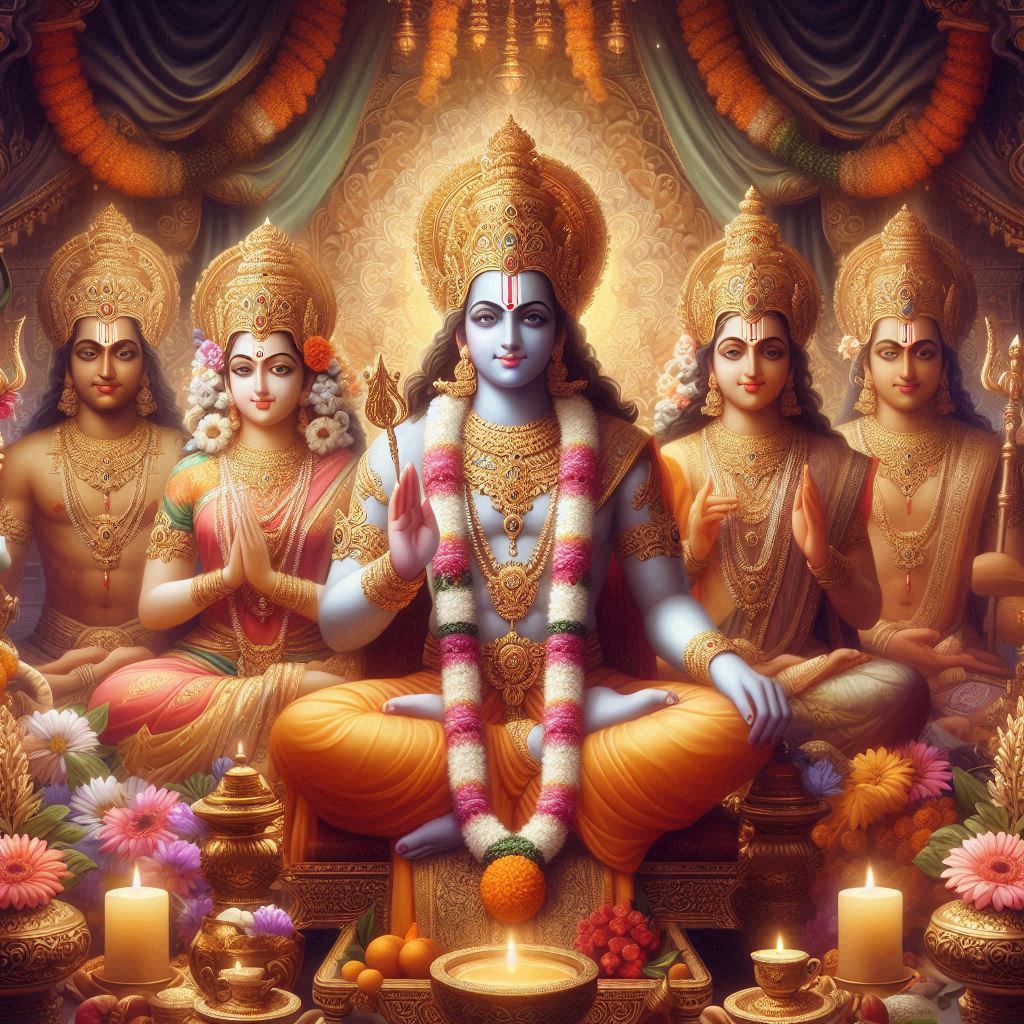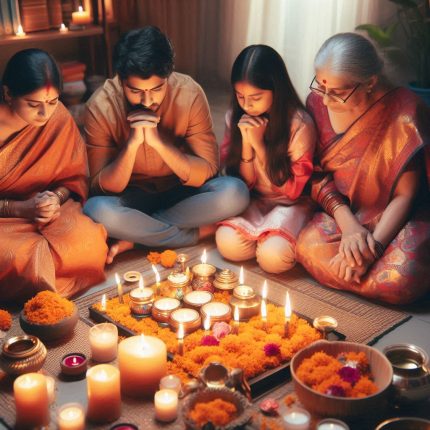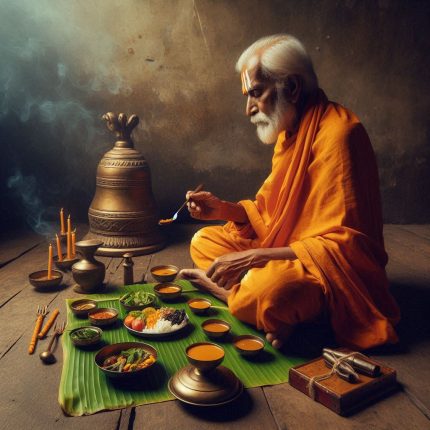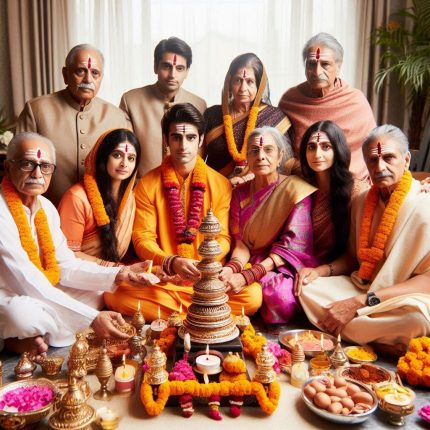Narayan Bali Puja: A Sacred Rite for Peace and Liberation
Samagri
for Puja:
Haldi [organic] (20gm), Kumkum [organic] (20gm), Tulsi Mala (1), Diya Batti (5), Beetle Nuts (5), Desi Ghee (20ml), Honey (20ml), Jaggery (Gudh) (20gm), Akshata [Yellow rice] (20gm), Yagno-paveetha (5), Karpoora [camphor] (5Tabs), Red/White/Yellow Cloth(1 mtr), Prasad [Laung, Elaichi, Mishri] (20gm), Mouli (25mtr), Ganga Jal (15ml), Durva [fresh] (1), Agarbatti (6)/Dhoop (2), Dakshina (100INR), God Idols (pair), Sambrani (2), Sambrani Holder (1), Kalash [small copper] (1), Panchpatra [small copper] (1), Diya Holder (2), Panchamrit spoon (1), Karpoora Holder(1), includes perishables [Beetle Leaves [fresh] (9), Flowers [fresh] (incl mala), Tulsi [fresh], Mango Leaves [fresh] (7)]
Small Havan:
Cow Dung Cake (2), Mango Wood (250gm), HavanSamagri [20+ Grganic Herbs] (100gm), Ghee (20ml)
Yajman to provide:
Curd (100gm), Milk (100ml), Mithai (250gm), Fruits [5types], Coconut (1), HavanKund, SuchiSarva (Havan Spoon) (1), Kalash [big] (1), Bowl [preferably copper/silver] (1), Spoon [preferably copper/silver] (1), Utensils [2 big Plates (for Aarti/Samagri), disposable Plates, Bowls & Spoons], First solid food (preferably Kheer or Payasam)
Introduction
The Narayan Bali Puja is a significant Hindu ritual performed to address unresolved issues, fulfil religious duties, and seek the peace and liberation of departed souls. This ceremony is especially important in addressing ancestral or family issues that may affect the living members. It is believed to appease deities and ensure that the departed souls attain peace and liberation (moksha). The Narayan Bali Puja is deeply rooted in tradition and spirituality, offering a way to honour the deceased and resolve lingering concerns.
Importance and Significance of Narayan Bali Puja
The Narayan Bali Puja holds profound spiritual and cultural significance:
- Resolution of Ancestral Issues: The puja is performed to resolve any unresolved issues or doshas (flaws) that may affect the family. It aims to address and resolve ancestral grievances or curses.
- Peace for Departed Souls: The ceremony seeks divine intervention to provide peace and liberation for the departed souls, ensuring their smooth transition to the afterlife.
- Cultural Tradition: The Narayan Bali Puja upholds important cultural traditions and practices, maintaining a connection to ancestral customs and religious duties.
- Spiritual Cleansing: The ritual is believed to purify the family and household, removing negative influences and restoring spiritual harmony.
Benefits of Narayan Bali Puja
Participating in the Narayan Bali Puja offers several benefits:
- Peace and Liberation: The puja helps in providing peace and liberation for the departed souls, aiding their journey to a higher spiritual realm.
- Resolution of Ancestral Issues: Performing the ritual addresses any unresolved ancestral issues or curses, promoting harmony and well-being within the family.
- Spiritual Cleansing: The ceremony cleanses the family and household of any negative influences, restoring spiritual balance and positive energy.
- Cultural Continuity: Engaging in traditional practices helps preserve cultural heritage and maintain a connection to ancestral customs.
Occasions to Perform Narayan Bali Puja
The Narayan Bali Puja can be performed on various occasions:
- Post-Death Rituals: The puja is often conducted following the death of a family member to address any unresolved issues or doshas related to the deceased.
- Pitru Paksha: It can also be performed during Pitru Paksha, a period dedicated to honouring ancestors and performing rites for deceased family members.
- Significant Dates: The ritual may be scheduled on specific dates or during particular family events, depending on cultural practices and astrological considerations.
Narayan Bali Puja Vidhi (Procedure)
The Narayan Bali Puja involves a series of traditional and ceremonial steps, each contributing to the ritual’s sanctity:
- Preparation: The family prepares for the puja by setting up a sacred space, including an altar with images or idols of deities. Special offerings such as food, flowers, and sacred items are prepared.
- Invocation of Deities: The ceremony begins with the invocation of deities, including Lord Vishnu (Narayan) and other relevant deities. The family offers prayers and seeks blessings for the departed souls and the family.
- Puja Rituals: A priest performs various rituals, including the offering of food, water, and other sacred items to the deities and ancestors. These offerings are made to provide comfort and aid in the soul’s spiritual journey.
- Pind Daan: A symbolic offering of rice balls (pind) is made as part of the puja, intended to provide nourishment and peace to the departed souls.
- Recitation of Mantras and Prayers: The priest recites mantras and prayers dedicated to the departed souls and the deities, seeking divine intervention and blessings.
- Charitable Acts: Families may perform charitable acts or make donations in the name of the departed souls as part of the ritual, reflecting the spirit of giving and compassion.
- Aarti and Conclusion: The ceremony concludes with aarti (a ritual of offering light) to the deities and ancestors. Family members may also express their personal prayers and thoughts for the departed souls.
Narayan Bali Puja Shubh Muhurat
The Shubh Muhurat (auspicious time) for the Narayan Bali Puja is often determined based on traditional schedules and astrological considerations. Consulting with a priest or astrologer can help identify the most suitable time for performing the ritual, ensuring that it aligns with cultural and religious guidelines.
Conclusion
The Narayan Bali Puja is a deeply meaningful and sacred ritual that plays a vital role in Hindu death ceremonies. By performing this revered puja, families address unresolved ancestral issues, seek peace and liberation for the departed souls, and restore spiritual harmony within the household. The ritual not only reinforces cultural traditions but also provides a profound way to honour and remember those who have passed away, ensuring their memory remains cherished and their spiritual journey is respected.






